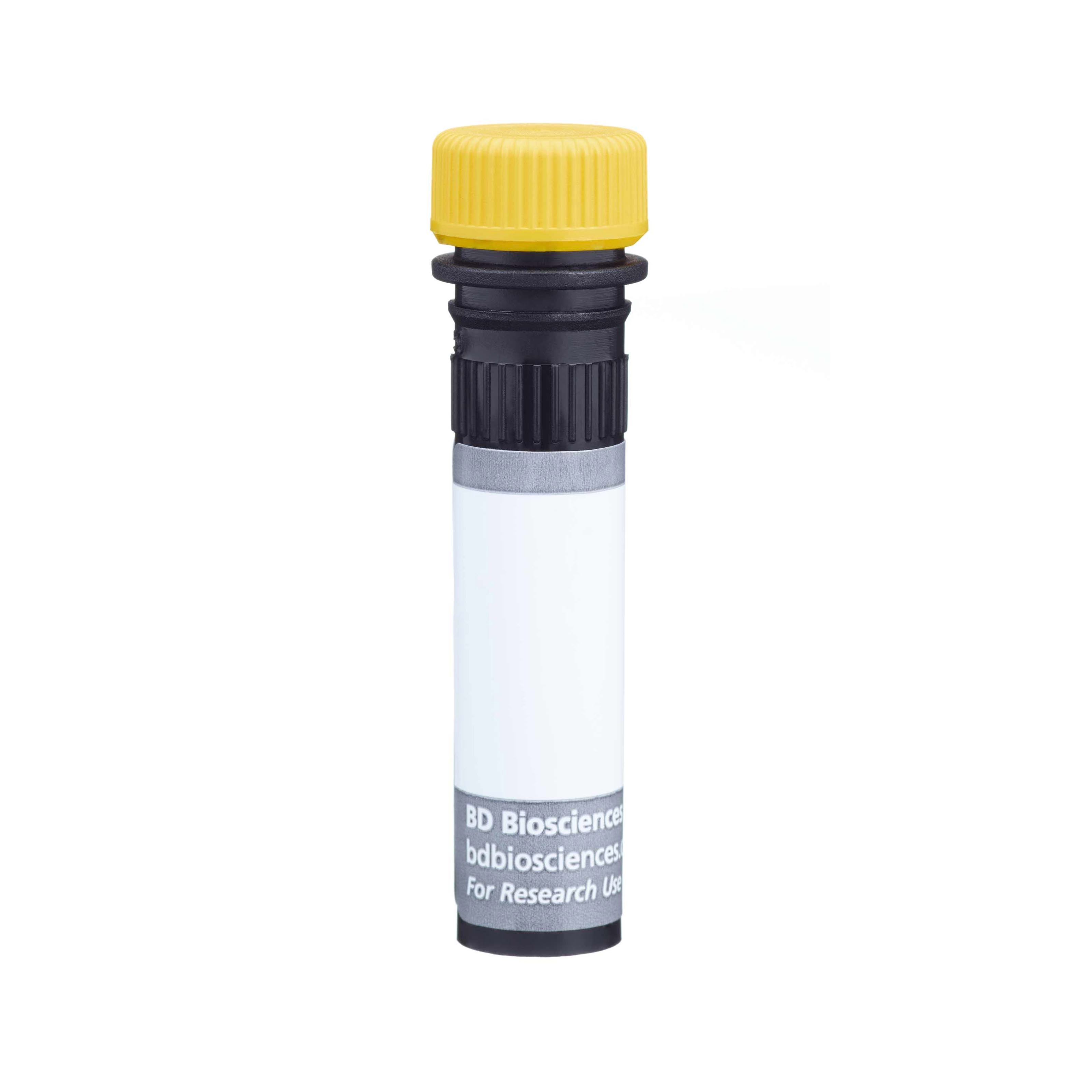Old Browser
This page has been recently translated and is available in French now.
Looks like you're visiting us from {countryName}.
Would you like to stay on the current country site or be switched to your country?


Regulatory Status Legend
Any use of products other than the permitted use without the express written authorization of Becton, Dickinson and Company is strictly prohibited.
Preparation And Storage
Recommended Assay Procedures
For optimal and reproducible results, BD Horizon Brilliant Stain Buffer should be used anytime two or more BD Horizon Brilliant dyes (including BD OptiBuild Brilliant reagents) are used in the same experiment. Fluorescent dye interactions may cause staining artifacts which may affect data interpretation. The BD Horizon Brilliant Stain Buffer was designed to minimize these interactions. More information can be found in the Technical Data Sheet of the BD Horizon Brilliant Stain Buffer (Cat. No. 563794).
Product Notices
- This antibody was developed for use in flow cytometry.
- The production process underwent stringent testing and validation to assure that it generates a high-quality conjugate with consistent performance and specific binding activity. However, verification testing has not been performed on all conjugate lots.
- Researchers should determine the optimal concentration of this reagent for their individual applications.
- An isotype control should be used at the same concentration as the antibody of interest.
- Caution: Sodium azide yields highly toxic hydrazoic acid under acidic conditions. Dilute azide compounds in running water before discarding to avoid accumulation of potentially explosive deposits in plumbing.
- For fluorochrome spectra and suitable instrument settings, please refer to our Multicolor Flow Cytometry web page at www.bdbiosciences.com/colors.
- Please refer to www.bdbiosciences.com/us/s/resources for technical protocols.
- BD Horizon Brilliant Stain Buffer is covered by one or more of the following US patents: 8,110,673; 8,158,444; 8,575,303; 8,354,239.
- BD Horizon Brilliant Ultraviolet 661 is covered by one or more of the following US patents: 8,110,673; 8,158,444; 8,227,187; 8,575,303; 8,354,239.
Companion Products






The 108724 monoclonal antibody specifically recognizes Axl which is also known as adhesion related kinase (ARK), JTK11, Tyro7, or UFO. Tyro-3, Axl, and Mer constitute the TAM subfamily of receptor tyrosine kinases (RTK). Axl is a single-pass type I transmembrane glycoprotein comprised of an extracellular region with two immunoglobulin (Ig)-like domains and two fibronectin type III (FNIII) domains, a transmembrane segment and a conserved intracellular tyrosine kinase domain. Axl is variably expressed by multiple cell types including monocytes, macrophages, dendritic cells, NK cells, platelets, endothelial cells, vascular smooth muscle cells, and fibroblasts. Axl binds to the vitamin K-dependent Growth arrest-specific protein 6 (Gas6) through its extracellular Ig-like domains. Ligand binding leads to receptor dimerization, and autophosphorylation of tyrosine residues within the cytoplasmic Axl domains. This results in the activation of downstream signaling pathways that control cellular adhesion, aggregation, phagocytosis/efferocytosis, proliferation, survival, and migration. Through these activities, Axl plays major roles in development, the regulation of hematopoiesis and immunity, and ensuring the integrity of the vascular system. Abnormal expression of Axl has been observed in various cancers and myeloproliferative disorders and by tumor cell lines.
The antibody was conjugated to BD Horizon™ BUV661 which is part of the BD Horizon Brilliant™ Ultraviolet family of dyes. This dye is a tandem fluorochrome of BD Horizon BUV395 with an Ex Max of 348-nm and an acceptor dye with an Em Max at 661-nm. BD Horizon Brilliant BUV661 can be excited by the ultraviolet laser (355 nm) and detected with a 670/25 filter and a 630 nm LP. Due to cross laser excitation of this dye, there may be significant spillover into channels detecting APC-like emissions (eg, 670/25-nm filter).
Due to spectral differences between labeled cells and beads, using BD™ CompBeads can result in incorrect spillover values when used with BD Horizon BUV661 reagents. Therefore, the use of BD CompBeads or BD CompBeads Plus to determine spillover values for these reagents is not recommended. Different BUV661 reagents (eg, CD4 vs. CD45) can have slightly different fluorescence spillover therefore, it may also be necessary to use clone-specific compensation controls when using these reagents.
Development References (8)
-
Gould WR, Baxi SM, Schroeder R, et al. Gas6 receptors Axl, Sky and Mer enhance platelet activation and regulate thrombotic responses.. J Thromb Haemost. 2005; 3(4):733-41. (Biology). View Reference
-
Janssen JW, Schulz AS, Steenvoorden AC, et al. A novel putative tyrosine kinase receptor with oncogenic potential.. Oncogene. 1991; 6(11):2113-20. (Biology). View Reference
-
Lemke G, Rothlin CV. Immunobiology of the TAM receptors. Nat Rev Immunol. 2008; 8(5):327-336. (Biology). View Reference
-
Linger RM, Keating AK, Earp HS, Graham DK. TAM receptor tyrosine kinases: biologic functions, signaling, and potential therapeutic targeting in human cancer.. Adv Cancer Res. 2008; 100:35-83. (Biology). View Reference
-
Rothlin CV, Carrera-Silva EA, Bosurgi L, Ghosh S. TAM receptor signaling in immune homeostasis.. Annu Rev Immunol. 2015; 33:355-91. (Biology). View Reference
-
Shiozawa Y, Pedersen EA, Patel LR, et al. GAS6/AXL axis regulates prostate cancer invasion, proliferation, and survival in the bone marrow niche. Neoplasia. 2010; 12(2):116-127. (Clone-specific: Flow cytometry). View Reference
-
Taichman RS, Patel LR, Bedenis R, et al. GAS6 receptor status is associated with dormancy and bone metastatic tumor formation.. PLoS ONE. 2013; 8(4):e61873. (Clone-specific: Flow cytometry). View Reference
-
Yumoto K, Eber MR, Wang J, et al. Axl is required for TGF-β2-induced dormancy of prostate cancer cells in the bone marrow.. Sci Rep. 2016; 6:36520. (Biology). View Reference
Please refer to Support Documents for Quality Certificates
Global - Refer to manufacturer's instructions for use and related User Manuals and Technical data sheets before using this products as described
Comparisons, where applicable, are made against older BD Technology, manual methods or are general performance claims. Comparisons are not made against non-BD technologies, unless otherwise noted.
For Research Use Only. Not for use in diagnostic or therapeutic procedures.
Report a Site Issue
This form is intended to help us improve our website experience. For other support, please visit our Contact Us page.